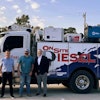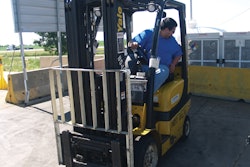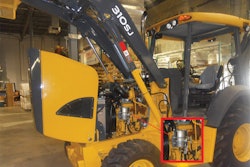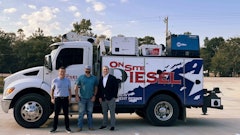
How is the diesel engine and diesel-powered equipment markets trending?
Overall reflective of economic conditions—fewer new technology/vehicle acquisitions; slowing on replacements—extending lives, tighter access to credit and uncertain business environment. On-road HD trucks showing good improvements, up to 15,000 sales August, a level not seen for over two years. Higher sales now due to uptick in freight traffic as well as pent up demand resulting from delays in new technology acquisition anxiety over new engine/emissions controls. Ag and mining seem to be going strong whereas construction still very slow owing to housing market conditions and lack of federal action in infrastructure spending.
Has the investigation in electric hybrids and other power sources hindered progress with diesel technology in anyway?
Absolutely not, we’d see them as synergistic and sustaining activities. Hybridization of diesel technology is a logical progression toward optimizing the vehicle or machine with the job at hand, and delivering lower energy consumption and GHG emissions.
But are diesel electric’s marketable on a large scale? Probably—but on a job and machine dependent way– big loaders that are big fuel consumers with lots of cycles are a prime opportunity – as are track type tractors. The same logic as today you see hybrid MDTs in pick up and delivery and refuse hauling kinds of operations – but not in long haul trucks. One has a hybrid-favored cycle and the other does not. I would add that the policymaker response to the idea of a hybrid bulldozer (referencing the Cat D7E) has a lot of WOW factor response.
As for other power sources (Natural gas, propane, etc. ) – there are some really big scale policy discussions and investments going on that could propel these (especially CNG) more into the mainstream for some still niche applications, but the jury is still out. With government funding in general being under scrutiny, these fuels will have to do more to make it on their own. Natural gas engines are successful and more choices out there than ever before, the emissions advantage over diesel has disappeared and now the primary allure is lower fuel prices. You don’t have the power density of CNG you have with diesel so there are some fundamental limitations there. But I have no problems seeing clean diesel technology compete with these fuels—the diversification of energy sources is happening. And we can see how a diesel running on higher blends of biofuels starts to look more interesting compared to natural gas, with far lower infrastructure investments.
How far has diesel technology come in the past couple of years?
If you were just waking up from a 50 year or even a 10 year nap—you would not recognize the diesel technology of today. You’d see no smoke, hear much less noise, and wonder what happened. We’ve been through a decade plus of milestones on the HDOH and the off-road world right now—everyone in industry has been running flat out in R&D and engineering to meet these incredibly low standards and still have a diesel that meets the needs of the customer.
What unique technologies have been created to continue the efficiency progression of diesel engines and equipment?
You’d have to put SCR at the top of this category. Finally, solutions to cut emissions deliver some efficiency gains for the customer! It’s about time—the customer would say. Though SCR is not a new technology per se, to go from five years ago -- a condition of no infrastructure for DEF, no standards or market, uncertainty about EPA approval… to where we are today is quite remarkable for all parties involved—OEMs, chemical industry, oil industry etc. There have been no real serious hiccups in this system – very encouraging for the customer and all parties involved.
What positive (or negative) impact has the diesel industry had on the U.S. and global economies?
Please see the DTF's whitepaper, "Diesel Powers the U.S. Economy" to find out more about the impacts diesel and diesel-powered products have on the economy.
Insight into the future of the diesel industry.
Strong, poised for expansion, more efficiency gains coming—still unmatched in the combination of power and performance.
Have government regulations become industry hindrances, such as the Tier emissions regs, or technological opportunities?
Probably a little of both, truth be told. On the one hand making products more efficient and lower emissions has broad benefits for everyone, the environment, the jobsite etc -- but it has not come without added cost, and not everyone sees those sometimes indirect benefits the same way.
For manufacturers, have we raised the bar so high now that the higher costs of new cleaner technology have scared away some customers and left more older higher emitting equipment out there longer? Now as we move forward to a focus on GHGs and energy efficiency – some benefits will be coming back to customers in fuel savings and productivity – but still at a higher cost. It has also added challenges on a global scale – with differing emissions requirements popping up across the globe, how do you manage that and stay competitive—when a base US product is very clean and using very clean fuels – yet in other customer locations – there is poor access to cleaner fuel or no desire to invest in low emissions.
What current issues is the diesel industry facing (both for engine manufacturers anddiesel-powered equipment manufactures)?
Continued pressure on legacy products will be something to watch. After 5 years of federal support for diesel retrofit programs, the Obama Administration proposed to terminate the program in this year’s budget, an astounding development for the broad group of over 400 environmental groups, industry, health organization supporters. While the outcome is still uncertain and Congress is moving to restore the program, there is a growing concern that states will pursue mandatory controls on existing diesel engines and equipment. Even after the NY Legislature killed a mandate for retrofitting diesel engines earlier this year, New York is launching a million dollar research effort to develop an inventory of all the diesel equipment in NY. States looking to reduce PM and NOx emissions are looking more at diesel retrofit, and black carbon and GHG reductions are also playing as drivers of this interest .
An equally if not more important issue is making sure diesel technology remains a player and a valued technology amidst new technologies benefitting from multi-million dollar advertising campaigns (natural gas). While diesel engines are not going away, the need for continued education and promotion about the role of the technology in the future is greater than ever before.


















